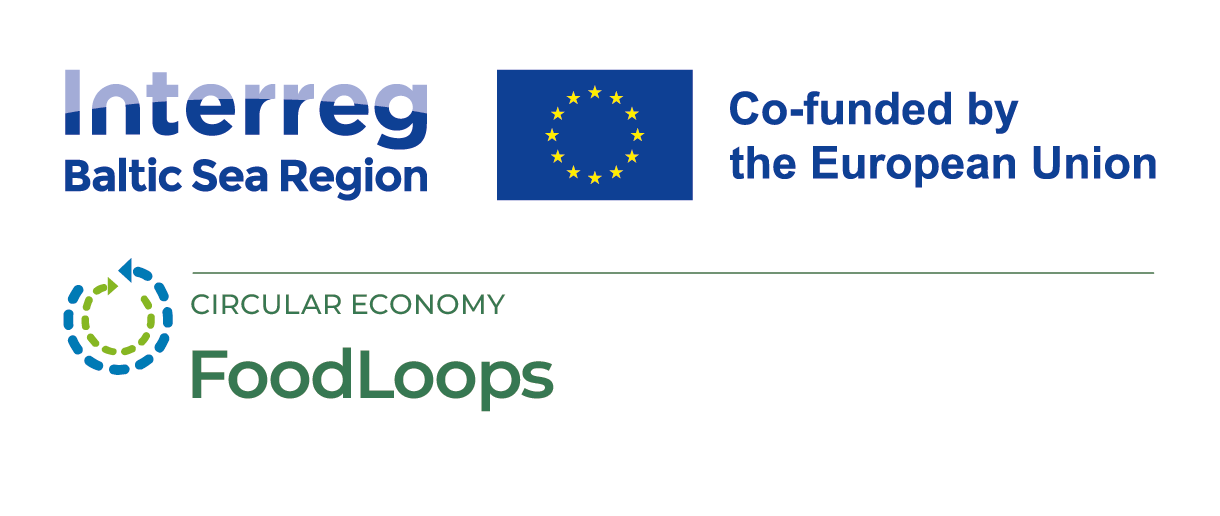Farmer Involvement in the Circular School Food System
Project: FoodLoops
Virtual Meeting
23. July 2025
11:00 - 12:00 (CEST)

FoodLoops: Advancing Circular Food Systems in Schools Across the Baltic Sea Region
The FoodLoops project made significant progress during its implementation period by promoting circular and sustainable food systems across the Baltic Sea Region. By bringing together schools, municipalities, farmers, caterers, and waste-management actors, the project demonstrated how local cooperation could reduce food waste and transform bio-waste into valuable resources.
Addressing a Regional Challenge
Food waste remained a major issue in several partner countries— with up to 17% of food prepared in some school canteens being discarded and national waste levels reaching 50 kg per capita. FoodLoops addressed this challenge by improving waste separation at source, promoting composting, and supporting the use of bio-waste as a resource in local agriculture.
More than 35 local events and several transnational exchanges enabled actors from Finland, Poland, Lithuania, and Germany to learn from each other and jointly co-develop solutions tailored to their communities. A key result of this collaboration was the completion of the FoodLoops Manual, “Local Cooperation for Circular Bio-Waste in Schools and Beyond,” developed through co-creation workshops in three countries and validated in two replication workshops involving around 40 participants.
Hands-On Pilot: School No. 61 in Gdańsk
One of the most notable achievements was the composting pilot launched at Primary School No. 61 in Gdańsk. Beginning in early 2025, teachers and around 50 students built two hot-compost piles using approximately 2,000 litres of organic waste. The school’s environmental club monitored temperature and moisture weekly until June 2025, ensuring safe and high-quality compost production.
The finished compost was applied in the school garden, forming the foundation of a new teaching module on the potato life cycle and ecological fertilisation. As highlighted in the Interreg Baltic Sea Region project story, the school emphasised that the pilot “strengthened sustainable habits while allowing students to learn by doing.”
Strengthening Cooperation Across Borders
Across the project, around 200 stakeholders took part in transnational meetings, study visits, and exchanges. These events supported the replication of bio-waste solutions, improved municipal waste-management processes, and opened new cooperation pathways—for example, between farmers and caterers on sourcing and compost use.
A project-wide survey confirmed the impact:
93% of respondents reported improved institutional capacity
90% strengthened their cross-border cooperation skills
Almost all organisations introduced more sustainable practices
Participants also reported a deeper understanding of challenges within school food systems and a growing interest in composting and bio-waste valorisation.
A Platform for Scaling Circular Practices
Through coordinated action, FoodLoops established a strong foundation for replicating and scaling circular bio-waste solutions across the Baltic Sea Region. The project delivered its planned outputs, strengthened networks, and inspired continued cooperation beyond its duration. FoodLoops demonstrated how Interreg Baltic Sea Region investments empowered local actors to lead circular transformation and build more resilient food systems for the future.
Project: FoodLoops
Virtual Meeting
23. July 2025
11:00 - 12:00 (CEST)
Project: FoodLoops
Virtual Meeting & Physical Meeting
25. April 2025
09:00 - 12:25 (CET)
Project: FoodLoops
Virtual Meeting
21. March 2025
10:00 - 13:00 (CET)
Project: FoodLoops
Virtual Meeting
28. February 2025
10:00 - 11:30 (BST)
Project: FoodLoops
Virtual Meeting
13. February 2025
09:00 - 11:00 (CET)
Project: FoodLoops
Physical Meeting
30. January 2025
00:00 - 23:59 (BST)
Project: FoodLoops
Virtual Meeting
11. December 2024
09:00 - 11:00 (BST)
Project: FoodLoops
Physical Meeting
06. November 2024
00:00 - 23:59 (CEST)
Project: FoodLoops
Physical Meeting
22. October 2024
00:00 - 23:59 (EEST)
Project: FoodLoops
Virtual Meeting
31. October 2023
13:00 - 14:30 (CET)
Project: FoodLoops
Virtual Meeting
19. September 2023
13:00 - 14:30 (CEST)